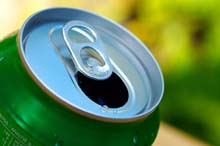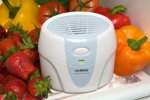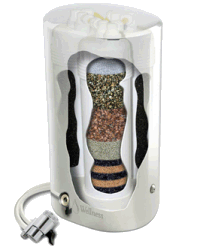New Research Reveals Shocking Dangers,
Past Deceptions, and Important Information
Related to BPA in Your Favorite Foods
What the FDA, EPA, and Big Corporations
DON’T Want You to Know!
by www.SixWise.com
Bisphenol-A (BPA) is a widely used industrial chemical that has been directly “linked” to reproductive abnormalities and an increased risk of breast and prostate cancers, diabetes and heart disease.
|

Is it safe to get your foods and beverages out of cans or bottles? New research says maybe not. Possibly a grave understatement once you learn more!
|
More than 100 peer-reviewed studies have found BPA is toxic even at low doses, yet it continues to be used in:
-
Plastic water bottles
-
Plastic gallon milk bottles
-
Plastic microwavable plates, ovenware, and utensils
-
Tooth sealants
-
Glasses
-
Baby toys, bottles, pacifiers, and sippy cups
-
WARNING: If plastic container does not state “made with LDPE (low density polyethylene) plastic”, which is BPA-free… it likely has BPA.
But there is another source of BPA that is very commonly used, yet not associated with the “plastic” products common to BPA: Canned foods and beverages also often contain BPA, as most have a plastic lining inside the can.
New Research Finds BPA in Canned Foods, Soups, Juices and More
Consumer reports tested for BPA in a variety of canned and non-canned products such as soup, vegetables, tuna, infant formula and more, from 19 brand names such as Campbell’s, Chef Boyardee, Del Monte, Nestle, and Progresso.
Their tests found BPA in almost all of the foods, ranging from trace levels to 191 parts per billion. Specifically:
-
The highest levels of BPA were found in canned green beans and canned soup.
-
Consumers eating just one serving of the canned vegetable soup Consumer Reports tested would get about double what the FDA considers typical average dietary daily exposure.
-
A 165-poud adult who eats one serving of canned green beans from Consumer Reports’ sample (which had an average of 123.5 ppb), could ingest about 0.2 micrograms of BPA per kilogram of body weight per day, which is about 80 times higher than their experts' recommended daily upper limit.
-
Children eating multiple servings per day of canned foods with BPA levels similar to those tested would ingest BPA levels close to those that have caused adverse effects in animal studies.
Further, organic brands tested did not always have lower BPA levels than non-organic brands, and BPA was even found in some canned foods labeled “BPA-free.”
How Bisphenol-A (BPA) Is Contaminating Your Food
Two-Year Old Study Also Raised Serious Concerns About BPA in Canned Foods
A 2007 study by the Environmental Working Group (EWG) found some concerning findings about BPA in canned foods … findings that are now being echoed two years later.
The group contracted a national analytic laboratory to test 97 cans of food purchased at three major chain supermarkets in the United States. Thirty brands of food were tested, including varieties such as soda, canned tuna, peaches, pineapples, green beans, corn, infant formula and tomato and chicken noodle soups. What did they find?
-
One in 10 cans of food tested -- and one in three cans of infant formula -- contained enough BPA in a single serving to expose a woman or infant to BPA levels more than 200 times the government's traditional safe level of exposure for industrial chemicals.
-
Among the worst foods tested -- chicken soup, infant formula and ravioli -- just one to three servings of the food contained levels of BPA that caused serious adverse effects in animal tests.
“The bulk of BPA exposure definitely comes from food," says Jovana Ruzicic, a spokesperson for the Environmental Working Group.
The FDA estimates that 17 percent of the U.S. diet is composed of canned foods, yet there are currently no government safety standards limiting the amount of BPA in canned food.
Deceptions by Corporations, US Gov’t and Tens of Millions in Tax Dollars
Studies of Bisphenol-A: Food Containers, Effects on Humans, Gov't Regs
As a matter of fact, the last time the FDA examined BPA exposures from food at all was in 1996, but no safety standard was set at that time.
Currently, federal guidelines based on decades-old research put the daily upper limit of safe exposure at 50 micrograms of BPA per kilogram of body weight. However, this level has not been updated to reflect the new research that’s come out in recent years, showing adverse health effects from BPA even at low levels.
Is There a “Safe Level” of BPA?
Given the numerous health concerns that have been linked to BPA, and its widespread presence in the United States (more than 90 percent of the U.S. population has detectable levels of BPA in their blood), many are asking, what is a safe level?
According to Consumer Reports, animal studies have shown abnormal reproductive development and other adverse effects at exposures of 2.4 micrograms of BPA per kilogram of body weight per day. Consumer Reports writes:
“[Based on these findings,] our food-safety scientists recommend limiting daily exposure to one-thousandth of that level, or 0.0024 micrograms per kilogram of body weight, following established practices to ensure an adequate margin of safety.”
National Geographic obviously appalled by FDA due to dismissing BPA - Bisphenol A Dangers (Studies, report micro levels, warns “30 parts per trillion”)
As it stands, the FDA’s special scientific advisory panel reported last year that current FDA safety standards for BPA are inadequate and a congressional subcommittee determined in 2009 that the FDA has relied too heavily on studies sponsored by the American Plastics Council (BPA is a building block of plastics).
Duke University Research: BPA – Bisphenol-A Study on Mice (More Proof)
"The FDA's reliance on industry studies in determining BPA's safety must be re-evaluated in light of clear signs industry is willing to mislead the American people on this public-health issue," said Rep. Bart Stupak, D-Mich., chairman of the House Energy and Commerce Committee's Oversight and Investigations Subcommittee, on ConsumerReports.org.
|
Keep Your Healthy Fruits and Veggies Fresh Longer!
Once you invest in fresh produce instead of canned for the health of your family, protect your investment using the MiniMate Refrigerator Unit.
The MiniMate deodorizes (replacing baking soda boxes in the fridge) and kills potentially dangerous food-borne bacteria. This extends the freshness and life of many foods 3 to 4 times longer!
Plus, the MiniMate:
-
Features an activated oxygen generator to eliminate odors, keep foods fresher longer and kill bacteria in your refrigerator
-
Naturally kills odors without any cover-up scents or fragrance
-
Reduces food spoilage and prevents cross-contamination of food odors
-
Breaks down pesticides and herbicides on produce

Find Out More About the MiniMate Refrigerator Unit Now!
|
Currently, there are bills pending in Congress that would ban the use of BPA in all food and beverage containers.
How to Reduce Your Reliance on Canned Foods
If you choose to limit canned foods in your diet because of the potential of toxic BPA, there are many other options. The top tips include:
If you’re not used to fresh produce, the one downside is that it can spoil before you get a chance to use it.
To keep your produce fresher, longer, simply put a MiniMate Refrigerator Unit in your fridge (it keeps food fresh for three to four times longer than normal, and even helps break down pesticides and herbicides on produce!).
The MiniMate deodorizes (replacing the backing soda boxes in the fridge), plus more importantly it also kills potentially dangerous food-born bacteria.
Using FDA-approved technology, the Minimate can eliminate most of the germs or mold that may be living on your foods without harming the food or leaving behind any residue.
This is important as these molds and bacteria can make you and your family sick, and they can also spoil food before you have a chance to eat it. This is especially true with organic foods, since there are no preservatives to help ward off the germs. So the MiniMate not only keeps your food safer and healthier, it also saves you money by cutting down on the amount of food you have to throw out and replace.
The MiniMate Refrigerator Unit is an essential gadget for anyone who is trying to eat fresher and avoid the BPA in many food packages (both plastic and canned). It also makes a perfect gift for the holidays and is one of our top recommended healthiest gifts under $50!
-
Choose glass instead of cans. Many popular canned foods, such as soup, beans, soda and more, are available in glass jars or bottles.
-
Choose frozen veggies instead of canned varieties. They're just as convenient, without the plastic tin-can linings.
A Simple Tip to Drastically Reduce Your BPA Exposure
WARNINGS!
Plastic containing BPA may be called:
-
Polycarbonate
-
Lexan
-
Polysulfone
Plastic that contains BPA carries the #7 recycling symbol, as well, so you can cut down on your exposure by avoiding plastic that is made from these materials or contains the #7 recycling symbol.
If you currently rely on bottled water to get you through the day, you can replace expensive and unhealthy bottled water with a safer, and many times less expensive solution by getting high-quality filtered water right in your own kitchen!
You can get the best of both worlds -- clean water and save money -- when you use a high-quality Wellness Water Kitchen Filter for your home.
The Wellness Kitchen Water Filter reduces Chlorine, Chloramines, Cysts, VOCs, pesticides, and herbicides -- including DEET -- below detectable levels for the life of the filter.
The Wellness Kitchen combines the best filtration and enhancement technologies to deliver the purest and most natural tasting water available. It effectively reduces harmful contaminants, while at the same time enhancing the water with adding important yet delicate wellness "ions and minerals" that your body needs.
So instead of buying bottled water, you can get superior water in your own kitchen. To take it on the go, simply fill up a glass bottle of your own and you're set with clean water -- without having to worry about BPA.
Also consider trying the Wellness H2.0, a personal reusable water bottle that is BPA-free -- and contains its own built-in filter! The Wellness H2.0 features a unique filtration system that not only purifies ordinary tap water, but also enhances the water for better absorption and hydration.
Even More Essential Tips to Minimize Your BPA Exposure …
|
The Wellness H2.O
Portable Water Filter Bottle
NO BPA!
Incredible Superior Water, Convenience, and NO BPA
The Portable Wellness H2.O enhanced water filter bottle is the next evolution in water technology. Not content with merely replacing wasteful bottled water, the Wellness H2.O combines the best portable filtration technology with rare Japanese stones and a patented enhancement process to produce an unparalleled quality of water.
-
The bottle is made of LDPE (low density polyethylene) plastic, which is BPA-free.
-
The ultimate environment product. Eliminates 1,100+ plastic bottles, reduces carbon emissions and conserves natural resources.
-
Saves you up to $1,000 in bottled water purchases per year.
-
Only bottle to produce nourishing, better-than-bottled-quality, "enhanced" water without the cost or waste associated with bottled water.
-
Assures you and your family of safe and healthy water ... no matter where you go.

Order Your Wellness H2.O Now!
|
-
Bottle your own water (in glass or BPA-free plastic) from a Wellness Kitchen Filtration System.
-
Buy your own Wellness H2.0, a personal reusable water bottle made of HDPE (high density polyethylene) plastic, which is BPA-free! It contains its own built-in filter!
-
Purchase glass baby bottles instead of plastic.
-
Buy milk and juice in glass containers (NOT plastic).
-
Use baby bottles and sippy cups made of polyethylene plastic (#1, #2, #4 recycling symbols) or polypropylene (#5) (these are usually colored, not clear)
-
Replace plastic food and drink containers and utensils with glass, ceramic or metal varieties.
-
Avoid using canned foods (as they mostly have plastic linings) or foods wrapped in plastic.
-
Avoid soda cans (as they mostly have plastic lining). If you drink soda, choose the glass bottles instead.
-
Avoid letting children put plastic toys in their mouths, or give them natural fabric toys instead of plastic ones.
-
Be careful with BPA-containing plastics, if you choose to use them. This means not exposing them to heat (microwave, dishwasher) or harsh detergents (bleach, etc.), throwing them away if they're scratched or worn, and not letting food or beverages sit in the containers for too long -- all of which increases the amount of BPA that may leach into your food.
-
Dental sealant may leach BPA. Although this is being debated, you may want to avoid dental sealants on your children's baby teeth, or ask your dentist if the sealant is BPA-free.
Can You Remove BPA From Your Body?
At present there is no natural product or drug that has shown to eliminate bisphenol-A and phthalates from the body. However, Dr. Georgiou, who is the inventor of HMD,™ the natural heavy metal chelator that we have mentioned in previous newsletters, has been doing pilot studies and says:
“We have been researching the effectivness of HMD in chelating xenobiotics such as bisphenol-A and phthalates as we were seeing women with irregular periods for years regulating while using HMD.
Even though heavy metals can play a role in hormonal imbalances, we identified that is very possible that HMD is also chelating these xeno-oestrogens (hormone mimicking molecules) such as BPA and other chemicals from plastics and cosmetics.
When we ran small pilot studies we indeed found that this was the case and are now seeking funding to pursue this avenue of research with a larger sample of people.”
If you are really concerned about the effects of all these chemicals, then you should not hesitate to take HMD, which will certainly get rid of a variety of toxic metals and possibly other xenobiotics as well. Use it with all the family – it is considered a gentle and natural chelator that can be used by all.
Complete Dosage Recommendations are found in prior SixWise article: Gardasil Controversy: Is the HPV Vaccine Safe … or Effective?
Another potentially helpful option to rid your body of BPA is using AbsorbAid® digestive enzymes, especially the Platinum Formula.
This may afford protection by increasing the amount of vital nutrients, including antioxidants and friendly bacteria, that your body would normally derive from foods.
By having adequate enzymes and nutrients readily available, your organs and bodily systems (especially the pancreas, liver, kidneys and intestines) will be less stressed, allowing for more adequate detoxification to occur.
The human body continually attempts to detoxify itself; however, due to overtaxed systems from malnourishment due to poor nutrient absorption (lack of essential enzymes and intake of valuable nutrients), poor quality air, water and general stress, the average American is overloaded with toxins.
AbsorbAid® Platinum may make your system more able to detoxify itself from many types of toxins, including BPA.
Recommended Reading
Why is BPA -- a Known Toxin -- Still Allowed in Your Plastic Bottles and Food Containers?
Are Canned Foods Safe? What are Their Potential Risks and Healthier Options Instead?
Sources
Consumer Reports Magazine December 2009
Environmental Working Group March 5, 2007